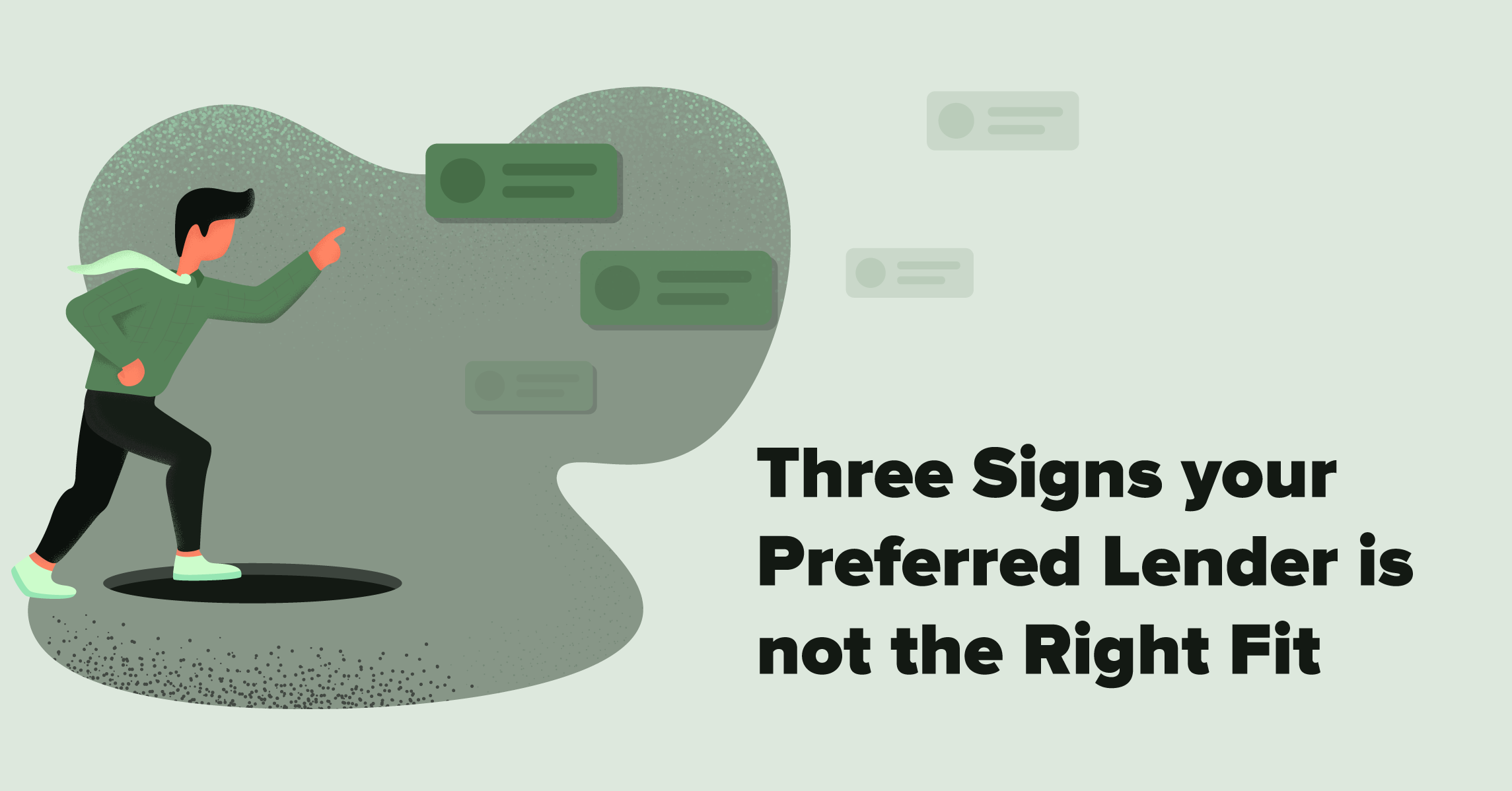
The relationship between real estate agents and lenders is a critical one. Both parties need to work in perfect harmony to provide a satisfactory home buying experience to their clients. However, we find that a lot of real estate agents are not satisfied with their lender.
Technology is creating a better breed of lenders who are more customer oriented and transparent. In fact, tech based lenders are winning market share by simplifying the complex mortgage application process for buyers and working closely in tandem with their real estate agent partners to close more loans.
In this day and age, if your lender is not thinking about incorporating more technology into their business to make it easy for buyers, and real estate agent partners alike, you should be rethinking your relationship. In fact, partnering with a bad lender can even hurt your lead conversion rate!
In this blog post, we talk about three major red flags to avoid when trying to find a preferred lender partner to work with. Additionally, we will also discuss the positive signs under those red flags that a realtor should pick up.
If you ask what do realtors want from lenders, these will be the points that would fit as a counter measure.
Your lender is not service oriented
One of the most important virtues of a lender is how much emphasis they place on providing a great customer service experience. In the digital age and providing a good experience is not possible without incorporating digital tools.
In fact, the lending market is getting increasingly dominated by non banking entities who are beating the banks at their own game. These fintech lenders are employing technology and digital tools to ease the stressful process of applying for a mortgage.
This new breed of lenders is streamlining the mortgage application process to provide a faster approval process, assist credit challenged buyers, and educating their customers about the various mortgage products available. Here are some signs to help you determine if your lender is service oriented:
Your lenders uses an online application. The lender has digital tools to simplify the mortgage application process. They should be using tools such as Maxwell or Blend to serve their customers. An online mortgage application system increases application start rates, allows lenders to collaborate with borrowers easily, and also automatically fills out various pieces of the application to reduce complexity and improve the overall experience. They may also employ closing cost tools to give the final estimates to your customers.
Your lender proactively follows up with clients. Another indicator of a service oriented lender is their emphasis on contacting their customers and partners in real time. According to BCG, mortgage buyers who receive proactive notifications via email and text are far more satisfied than those who don’t. Ask your lender if they have a system in place to text or email their customers who need more attention or help.
Your lender cares about client satisfaction. A service oriented lender always has a system or process in place to track and measure client satisfaction. Zillow or Yelp Reviews, internal customer satisfaction surveys, and post closing check ins are all signs that your lender cares about measuring how satisfied their clients are.
Your lender is not transparent
Effective communication and transparency between you and your lender is important for converting leads into happy clients. Agents often complain that lenders do not keep them updated on the mortgage approval process and that it hurts their reputation in front of the buyer.
You should only work with lenders who provide complete information about where your leads are in the pre approval process. This allows you to keep your buyers informed and keeps them from switching to another agent due to a perceived sense of inactivity.
Lenders that are not transparent with their real estate agent partners will also be unlikely to deliver a positive client experience. Here are some signs to determine if your lender transparent:
Your lender uses a CRM system. Transparent communication between the lender and the agent is so much easier if your lender uses a CRM. If a lender does not have a system in place, you should consider adding them to yours and see if they’re open to communicating with your leads through your systems.
Your lender tracks their pipeline. If your lender can transparently show you a pipeline of where your leads are in the application process that can significantly improve your ability to close leads and prioritize your buyers. This can be as simple as a spreadsheet or as complex as inviting you to their loan origination system so you can see what’s going on.
Your lender has a standardized fee schedule. While lenders are required by law to disclose their rates and fees clearly to their borrowers, they are not required to do so with real estate agents. Top quality lenders, however, are transparent about their rates and fees with their real estate agent partners. While the lender with the lowest fees may not necessarily be the best pick every time, your buyers will definitely be happier knowing what to expect to pay for their mortgage before they engage with your lender.
Your lender lacks product diversity
Borrowers come in all shapes, sizes, and financial situations! A lender with a wider mix of mortgage products will have a higher chance of converting your home buyer. If you are planning to partner with a lender, make sure they have a wide mix of fixed interest, variable interest, FHA and VA mortgage products available.
In addition, it is necessary that your preferred lender has considerable experience working with customers who have a bad credit history. As an agent, it is inevitable you’ll find leads with bad credit and it will be your lender’s responsibility to help them improve their credit to be able to afford a mortgage.
Here is how you can determine if your lender offers the product diversity you need for your clients:
Your lender offers fixed and variable interest loans. A lender should be able to offer a product portfolio with at least a mix of fixed and variable interest loans to cater to different buyers. In addition, if your lenders offers FHA and VA loans, that’ll help you work with lower down payment buyers and veterans as well.
Your lender has a client brochure. Client brochures are used by lenders to educate their buyers about various mortgage options, you should ask your lender for a copy their client education brochures. If they do not have one, it could mean that they are not serious about client education.
Your lender has a credit repair partner. Not all buyers have the perfect credit profile right away. A good chunk of buyers might need to work on getting their credit up to qualify for a mortgage or an interest rate they can afford. Your lender should have appropriate credit repair partners they can refer leads with bad credit to.
Partnering with the right lender can make a huge difference to your lead conversion rates. With the dawn of the digital age, lenders are better equipped to deliver a great customer experience at a lower cost. If you are a real estate agent and looking to partner with a lender, make sure partner with the right ones and avoid the common pitfalls of the lender and real estate agent relationship.
 Aiva
Aiva





